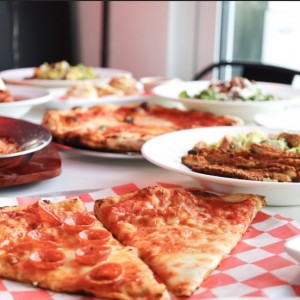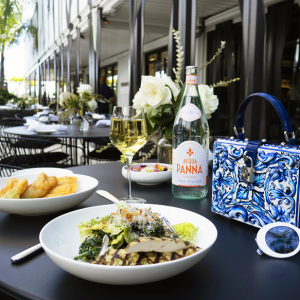Neida Esquivel understands what makes great Mexican food. At 28, she’s made a career out of serving it and providing the essential ingredients for others to to make it at home. Since 2013, La Primavera has served as a Hispanic-focused grocery store and fast-casual purveyor of authentic Mexican cuisine. Perhaps most importantly, however, it has served as a hub for the area’s Latino community. But what is authentic Mexican cuisine? Just because a restaurant claims it serves Mexican food doesn’t mean it’s authentic.
Amalia Flores owns Sarasota-based Chef Amalia Private Chef & Catering Services and appeared on the first “Master Chef Latino” that aired in the United States. She made it through the initial 2,000-person auditions in Miami to become one of 30 competitors who made it to the show, which aired in 2018 on Telemundo. While Flores’ torres de nopal con chimichurri (more on nopal later) didn’t bring her the win, she calls her appearance “the best experience of my life.”
Born and raised in Guadalajara, Mexico, Flores has some strong opinions about the difference between authentic Mexican cuisine and Tex-Mex. With her extensive culinary training, Flores creates globally-inspired dishes that delight her clients, but the food she grew up with—the meals that made her want to become a chef—were decidedly Mexican. “Traditional, authentic Mexican cuisine is super simple,” Flores says. “It’s tortillas, peppers, salsas, beans and a protein — beef, pork, fish. It’s fresh ingredients, fresh produce. Big flavors and incredible colors.” Cilantro, tomato, and lime are staples, too.
Flores says most of the Mexican restaurants in this area — including some of the most popular — lean more Tex-Mex than authentic Mexican. That’s not necessarily a bad thing. Those recipes are good, too. But, Flores says, “We don’t eat Monterey jack cheese. We don’t use cumin. We don’t use ground beef. These things were made standard because of the need to appeal to a broad population.”
Margaritas? Nachos? Burritos as big as your head? They’re for the Cancun tourists. Finding an authentic experience means you may have to go beyond a simple Google search. It’s the food trucks, grocery stores, and off-the-beaten-path spots. But some of these places are centrally located — places like La Primavera, where Esquivel and her bustling staff welcome a steady stream of satisfied customers.
“We try to be a spot where you can literally do everything,” Esquivel says. “You can send money to Mexico, you can recharge your phones to make calls to Mexico. It’s all kind of connected to not just Mexico, but to our culture.” La Primavera is the type of place where patrons constantly bump into friends in the grocery aisles, where diners converse with strangers at the next table.
“We have a little bit of everything that you can ever need in a Hispanic household — or in any household — to kind of bring that Hispanic Latino vibe,” Esquivel says. “People can come here and grab lunch or do their weekly grocery shopping, or for some late-night cravings.” Ah, yes. The late-night cravings. If you’ve ever wondered where local chefs, bartenders, servers, and back-of-house staff go for a bite to eat after a long shift, it’s La Primavera. Every weekend, around the time the bars are closing, a line forms in the courtyard on the side of La Primavera. They’re there for the tacos: al pastor, lengua, tripa, chorizo, carne asada. In the grocery section, you’ll find nearly every ingredient one might need to create an authentic Mexican feast, including nopal, a cactus native to Mexico and a key ingredient in its cuisine.
“We eat it almost every day,” Flores says. “We bake it, fry it, broil it. I recently made my nopales salad live on ABC7 for Hispanic Heritage Month.” The nopal that La Primavera sells is locally sourced, very local. Esquival’s father and the founder of La Primavera, Juan, grows nopal cactus on a farm in Bradenton. “He’s obsessed with his little farm,” Esquivel says.
The nopal that comes in nearly every dish La Primavera serves, and the stuff you can buy in the grocery store all comes from Esquivel’s father’s farm. La Primavera also serves as a hub for the area’s Latino community. Following Hurricane Ian, it was a meeting place for friends and neighbors to reconnect and commiserate over comfort food. This sense of community — this coming together — there’s a word for it.
“In Spanish, we call it convivir,” Esquivel says. “It’s a nice word. When it gets full of people, I think you definitely feel that word. You believe it. We’re existing with each other. We’re enjoying each other’s company and obviously food brings people together — families and all types of people.”
La Primavera on Washington Blvd. in Sarasota is actually the third grocery store/restaurant the Esquivel family opened. The family owns Los Laureles in Bradenton and another La Primavera across the state in Fort Pierce. The Esquivels invite ideas from employees on menu items and ways to expand offerings. “Everyone here is family,” Esquivel says. “So if anyone has an idea, I love to take them to the office. We talk about it, we brainstorm. There’s quite a few recipes where I could say, ‘Oh, this one was designed by this person, this one was designed by this person.’ It really is a group effort.”
For those unfamiliar with authentic Mexican cuisine, some of those crowdsourced recipes — like the beef tongue or tripe — could be intimidating.
“You have to be open-minded when it comes to those types of foods because it is an acquired taste,” Esquivel says. “But I think that if you really want the authentic experience, you have to be able to try anything. We always get that question, ‘What do you guys like? So, we show them when we like.” And they show them exactly what it means to be authentic.










